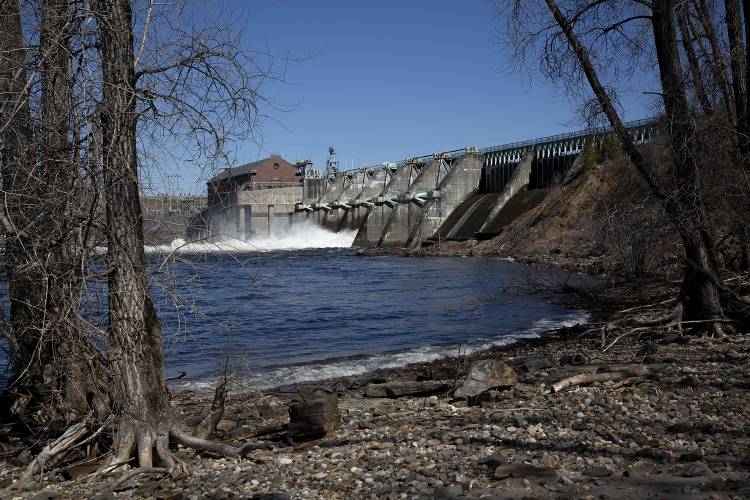Upper Valley towns seek voice in Wilder Dam’s future
|
Published: 04-09-2024 6:31 PM
Modified: 04-15-2024 11:17 AM |
WILDER — With the Wilder Dam’s 40-year federal license expiring, Hartford residents and officials are hoping to take advantage of a “once in a lifetime” chance to have a voice in the dam’s future, said Town Manager John Haverstock.
The Federal Energy Regulatory Commission, or FERC, has overseen the harried relicensing process for the dam — owned and operated by Great River Hydro — which began in 2012. The license, renewed last in 1979, expired in 2018.
Despite operational changes to the dam proposed in the new license, river conservation advocates and municipal officials still harbor concerns about the dam’s impact on river bank erosion.
But they’re also seeing an opportunity to revamp recreation along the Connecticut River.
In Hartford, the 80-plus acres along the river that make up Kilowatt Park are owned by Great River Hydro, but maintained by the town. Hartford is looking for “the first financial support” from the company it’s ever received, Haverstock said.
The town spends around $60,000 a year to maintain the park. But with “long deferred capital improvements,” the town is feeling “the absence of funding to realize those goals,” he said.
Among them are intentions to establish conservation easements in the park, enhance river access and make it compliant with the American with Disabilities Act, creating historical informational kiosks, refurbishing picnic areas and installing restrooms.
The Connecticut River Conservancy identified other properties along the river owned by the Great River Hydro — but managed by towns or other entities — that the company contributes maintenance costs to. “That intrigued us,” said Scott Hausler, director of the Hartford Parks and Recreation Department.
Article continues after...
Yesterday's Most Read Articles
In a letter to FERC, the town is asking Great River Hydro to cover the $60,000 annual upkeep costs as well as contribute $120,000 each year to be added to a capital reserve fund to make improvements to the area.
The letter also suggests re-opening the footbridge across the Wilder Dam, “which would essentially connect recreation assets and the communities on both sides of the Connecticut River,” it reads. “Re-establishing connection between New Hampshire and Vermont is important for public engagement and pedestrian connections.”
A working footbridge over the dam could carry pedestrians from Kilowatt Park to Boston Lot in Lebanon.
“This would all be a win for the river and the region and the town,” Hausler said.
To submit additional suggested comments to be added on behalf of Hartford in the town’s letter to FERC, email recreation@hartford-vt.org. The public comment period for the town will close April 12 at 5 p.m.
While such licensing processes typically take around five years, this one was delayed repeatedly by a handful of government shutdowns and protracted ecological studies, some of which were prolonged when the 2014 closure of the Vermont Yankee Nuclear Power Plant in Vernon, Vt., changed conditions in the river.
Plus, “this is just a huge scale license,” said Kathy Urffer, the nonprofit Connecticut River Conservancy’s director of policy and advocacy.
Covering an 85-mile stretch of the Connecticut River, the license includes two other dams owned by Great River Hydro in Bellows Falls, Vt., and Vernon. The company bought 13 dams along the Connecticut and Deerfield rivers from TransCanada in 2017 for $1.06 billion. In 2022, Hydro-Québec purchased Great River Hydro.
Great River Hydro, based in Westborough, Mass., bills itself as a “carbon-conscious energy source.”
The amended license is poised to change the pace of water flowing through the dam. The company “essentially hold(s) most of the river back most of the day” and has been for the last 40 years, Urffer said. Once or twice a day, when people are waking up in the morning or getting home from work, electricity use peaks and rates spike. That’s when the company “puts the river through the turbines and generates electricity,” she said.
But under the proposed license, “they’d be moving the river through the turbines all the time,” Urffer said. “Right now, they can peak for as long as they want to as often as they want to, at whatever intensity.”
The license amendment caps “peaking” — when the company generates the most electricity and pumps the most water through the dam — to a certain number of hours each month, and mandates that the company ramp up and wind down its flows gradually, rather than moving from 800-cubic-feet-per-second to 14,000 in a matter of minutes.
New operations would mimic “a more natural hydrograph,” Urffer said. Wildlife isn’t evolved to handle water flow at the levels of “a 100-year storm that’s then just immediately shut off.” It interrupts breeding and migration patterns.
Still, the new proposed license doesn’t address longstanding concerns about the impact of the dam on stream bank erosion, Urffer said.
In 2015, erosion from the river created structural concerns, and the subsequent closure, of part of Lyme’s River Road, which runs alongside the Connecticut. Many locals blamed that erosion on the dam, and tried and failed to have Great River Hydro take accountability.
“All through the relicensing they’ve consistently not taken responsibility for erosion along the banks,” Urffer said. Two studies that Great River Hydro were required to do on erosion “didn’t examine” the surface water fluctuations in part caused by the dam, she said. “In our opinion, they’re told to look at an apple, and they described an orange.”
In a draft letter to FERC regarding the dam relicensing, the Town of Norwich emphasized the need for more information about the dam’s impact on erosion, especially in light of the fact that the town “has already experienced significant bank erosion as a result of last summer’s heavy rains,” the letter, included in the April 10 Selectboard meeting packet, reads.
It emphasizes that FERC should require as a stipulation of the license that Great River Hydro “hire an independent entity to continuously monitor water quality, flooding impacts, bank erosion, sediment transport, toxin levels and the health of plants and wildlife.”
The Town of Hartford’s letter to FERC also requests “long-term monitoring of bank stability” and the implementation of any necessary “mitigation measures...before another generation of property owners loses more land.”
For its part, Great River Hydro said erosion along the Connecticut River, has little if nothing to do with the Wilder Dam. “Erosion above and below (the dam) is largely a function of naturally occurring high flows,” wrote John Ragonese, FERC license manager for Great River Hydro, in an email on Tuesday. Due to “high flow due to precipitation or snowmelt and resulting runoff,” Ragonese wrote that erosion “will likely continue as it does in practically all other rivers.”
With the operational change on peak flow levels included in the new license, there’s going to be less intense water movement. “But there still will be some,” Urffer said, adding that there’s nothing in place demanding that Great River Hydro study the impact of those operational changes on the shoreline.
While about a year out from finalizing the license, and with negotiations at the state level still on the table, “we can see the end,” Urffer said.
Individuals can comment at the following link: https://ferconline.ferc.gov/QuickComment.aspx. The Wilder Dam project is listed under P-1892.
The public comment period closes on April 22.
Frances Mize is a Report for America corps member. She can be reached at fmize@vnews.com or 603- 727-3242.
CORRECTION: In 2017, energy company Gr eat River Hydro purchased 13 dams from TransCanada. A previous version of this story incorrectly stated which company purchased the dams.



 Lebanon moves forward with plans for employee housing
Lebanon moves forward with plans for employee housing Howard Dean weighs (another) run for governor
Howard Dean weighs (another) run for governor Colby-Sawyer president announces plan to depart
Colby-Sawyer president announces plan to depart
